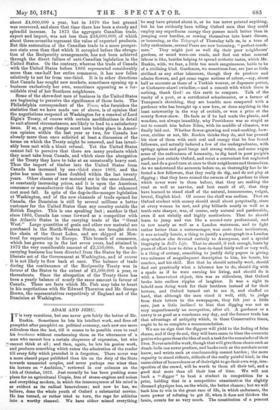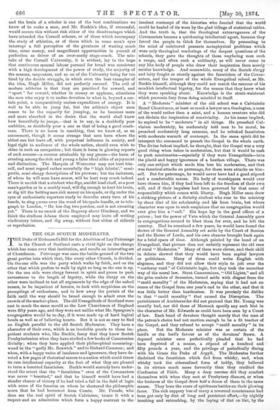ADAM AND JEAU.
T is very vexatious, but one never gets fairly the better of Mr. 1 Ruskin. Sometimes he lets his intellect work, and fires off pamphlet after pamphlet on political economy, each new one more ridiculous than the last, till it ceases to be possible even to read his brochures without condemning them as the utterances of a man who cannot lose a certain eloquence of expression, but who --cannot think at all ; and then, again, he lets his genius work, and produces something which raises the admiration of the reader till every folly which preceded it is forgotten. There never was a more absurd paper published than his on the duty of the State towards unmarried couples, and never perhaps one wiser than his lecture on "Ambition," reviewed in our columns on the 18th of October, 1873. Just recently he has been pushing some plans for an agricultural Utopia, free of steam-engines and noises and everything modern, in which the inconsequence of his mind is as evident as its radical benevolence ; and now he has, we believe, done the whole youth of Oxford a substantial service. He has turned, or rather tried to turn, the rage for athletics into a worthy channel. We have either missed everything he may have printed about it, or he has never printed anything, but he has evidently been telling Oxford men that they could employ any superfluous energy they possess much better than in jumping over hurdles, or rowing themselves into heart disease, or becoming, as the Telegraph of Thursday tells us, in a tone of lofty enthusiasm, several Peers are now becoming, " perfect coach- men." They might just as well dig their poor neighbours' gardens, or mend worn-out roads, and find out what manual labour is like, besides helping to spread aesthetic tastes, which Mr. Ruskin, with, we fear, a little too much sanguineness, holds to be of a civilising kind. Gardeners, we sometimes fear, are just as little civilised as any other labourers, though they do produce and admire flowers, and get some vague notions of coloar,—say, about half as accurate as those of a Turkish weaver, or Japanese potter, or Cashmere-shawl swindler,—and a conceit with which there is nothing, thank God! on this earth to compare. Talk of the vanity of a poet, or a certificated schoolmaster, or a farmer of Tennyson's sketching, they are humble men compared with a gardener who has brought up a new fern, or done anything in the least noteworthy in the way of orchids, or won a prize at the county flower-show. He feels as if he had made the plants, and wonders, not always inaudibly, why Providence was so stupid as not to consult him before Eden, with its muddle of climates, was finally laid out. Whether flower-growing and road-making, how- ever, civilise or not, Mr. Ruskin thinks they do, and has pressed his view of them with such zeal and energy that he has found followers, and actually induced a few of the undergraduates, with springy spines and good lungs and strong wrists, and some vague sense of the enthusiasm of humanity, to dig hard in poor people's gardens just outside Oxford, and recut a convenient but neglected road, and do a good turn at once to their neighbours and themselves. As we understand the accounts before us, so thoroughly has he in- fected a few followers, that they really do dig, and do not play at digging ; that they have roused the owners of the gardens to ideas which never were in them before, that they are making the road as well as navvies, and best result of all, that they have learned to stand chaff of the natural, humoursome, vulgar, brutal, English kind. Of course the chaff was endless. That an Oxford student with money should stroll about perpetually, stare at every woman he met, and play billiards nearly as well as a tenth-rate sharper, was, of course, only natural and pardonable, even if not strictly and highly meritorious. That be should learn to jump and run like a second-rate professional, and to row nearly as well as a London waterman, and to tight rather better than a costermonger, was more than meritorious, it was actually heroic, a thing to justify a photograph in a London shop-window else devoted entirely to Anonymas, and a special biography in Bell's Life. That he should, if rich enough, learn by years of effort how to drive a four-in-hand fairly well or very well, is a thing of ecstasy, something to justify daily papers in giving two columns of magniloquent description to him, his beasts, his coaches, and his skill. But that he should actually work, should find out practically what a labourer has to do, should dig with a spade as if he were earning his living, and should do it with a benevolent object, this was so ridiculous, that Oxford broke into endless ripples of laughter. It was a sight to behold men doing work for their brethren instead of for their bettors, and Oxford turned out to see it, and chaffed so hard, that although the men stood it well, still, to judge from their letters to the newspapers, they felt just a little sore, just a little inclined to hint that digging was not so very ungentlemanly an occupation, after all. A gardener or a navvy is as good as a coachman any day, and the former trade has that advantage of antiquity which, in these Conservative times, ought to be so complete a recommendation. We see no sign that the diggers will yield to the feeling of false shame, and if they do not, they will have cause to bless the eccentric genius who gave them the idea of such a task for the remainder of their lives. Never mind the work, though that will give them chests such as dumb-bells can never produce, and backs such as the acrobats never know, and wrists such as coachmanship cannot harden ; the mere capacity to stand ridicule, ridicule of the really painful kind, in the cause either of benevolence or of their right to go their own way, irre- spective of the crowd, will be worth to them all their toil, and a good deal more than all their loss of time. We will not back a " digger " to beat a student in competition for a prize, holding that in a competitive examination the slightly diseased physique has, on the whole, the better chance ; but we will back him to win in the great race of life, in which endurance, the mere power of refusing to get ill, when it does not thicken the brain, counts for so very much. The constitution of a peasant and the brain of a scholar is one of the best combinations we know of to make a man, and Mr. Ruskin's idea, if successful, would secure this without risk either of the disadvantages which have attended the Cornell scheme, or of those which accompany the study of athletics, or of those which in some men's eyes interrupt a full perception of the greatness of wasting much time, some money, and magnificentopportunities- in pursuit of perfection as driver of an over-costly stage-coach. The mis- take of the Cornell University, it is evident, lay in the hope that continuous manual labour pursued for bread was consistent with a high development of the power of study, the majority of the masons, carpenters, and so on of the University being far too tired by the double struggle, in which even the best exemplar of the idea, Hugh Miller, did not perfectly succeed. The evil of modern athletics is that they are practised for reward, and " sport " for reward, whether in money or applause, stimulates the men who enjoy it to undue devotion to what is, beyond a cer- tain point, a comparatively useless expenditure of energy. It is well to be able to jump far, but the athlete's object soon ceases to be the capacity for jumping, as he becomes more and more absorbed in the desire that the world shall know how beautifully he jumps,—that is to say, in a decidedly poor ambition, as decidedly poor a one as that of being a good coach- man. There is no harm in coaching, that we know of, as an amusement, though it seems strange that men born where the ablest can but leave off, with perpetual influence in society, and legal right to audience of the whole nation, should even wish to shine in such an occupation ; but there is harm in glowing reports of such success—a success attainable by any groom—the harm of creating among the rich and young a false ideal alike of enjoyment and distinction. The Marquis of Worcester may not hurt him- self, and must regard rather scornfully the " high falutin'," semi- poetic, semi-slangy descriptions of his prowess; but the imitators, of whom he will soon have scores, will be hurt very much indeed. There is no risk that a student who digs, amidst loud chaff, at a poor man's garden or in a muddy road, will dig enough to hurt his brain, or dig till the betting men risk money on his spade, or dig under the eyes of enthusiastic reporters ready to describe every turn of his hands, to sing rmans over the wood of his spade-handle, or to tele- graph to London, " He has dug two perches, and is not sweating yet." There is no smack of the Regency about Hincksey, and we think the studious Adams there employed may leave off writing vindicatory letters, and dig away, without fear either of ridicule or reprobation.



































 Previous page
Previous page